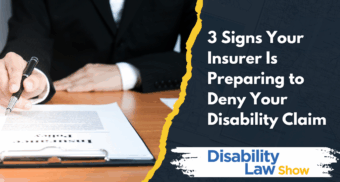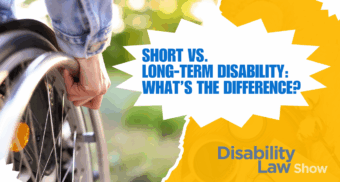Disability Law Show – Season 6 Episode 1
Episode Summary
3 THINGS TO KNOW …IF AWAITING TREATMENT AND APPLYING FOR LTD on Season 6 Episode 01 of the Disability Law Show with disability lawyer and Partner Tamar Agopian.
Watch above to discover the steps you need to take when the insurance company cuts off or denies your long-term disability claim anywhere in Canada, on the only disability law show on TV and radio in the country.
Episode Notes
Crohn’s diagnosis and own occupation period
Due to my diagnosis of Crohn’s disease and the pandemic, my condition deteriorated physically as well as psychologically. I had to stop working and was initially approved for LTD. At the two-year mark, I started receiving constant requests for updates from my insurer. Are my benefits going to be cut off?
- Own vs. any occupation periods: After two years on long-term disability, most disability policies will require claimants to prove they are not only disabled from working in their own previous occupation, but any occupation. This change in the definition of disability often leads to a cut-off from disability benefits for many claimants despite a continued inability to work.
- Secondary medical conditions: An initial medical condition can lead to a further deterioration of health and other possible illnesses for many disability claimants with autoimmune claims. Claimants should ensure their insurers are provided with all medical reports, including updated files on new symptoms.
Employer refuses medical accommodations
My doctor says I can stop LTD and go back to work but with restrictions. Unfortunately, my employer says they can’t make any accommodations, and I have to wait until I can go back to work full-time. Will I lose my LTD benefits if I can’t work?
- Employment and disability rights: Legal claims can be composed of both disability and employment law elements. It is vital to seek legal advice from a lawyer with experience in both areas of law. Claimants should ensure their doctors provide detailed restrictions and possible accommodations to their employers.
- Accommodations in the workplace: All employers have an obligation to provide accommodations to employees with medical conditions and restrictions when they are ready to return to work. A refusal to do so can be considered a human rights violation. Claimants who are unable to work due to severe restrictions should continue to receive disability benefits.
3 Things you need to know…if you’re waiting for treatment and applying for LTD
- Support of your doctor and eligibility: Claimants must first receive approval from their treating doctors and medical team in order to qualify for long-term disability benefits. Individuals unsure if they should apply for disability benefits should speak to their physicians about their options.
- Seek and comply with recommended treatment: Most disability policies require claimants to seek and comply with recommended treatment. Claimants who refuse to do so could be in violation of their policy provisions and would not qualify for benefits. Treatment must be considered reasonable and cannot be unsafe for claimants.
- A diagnosis is not necessary: Claimants do not require a medical diagnosis in order to file a valid legal claim. Debilitating symptoms and confirmation from a treating doctor should lead to approval for disability benefits. Symptoms should be well documented as well as a treatment plan.
Declined LTD and numerous appeals
After an accident years ago, I still have chronic pain in my neck and back. I managed to keep working but had to stop when I started getting chronic sinus and chest infections. I applied for LTD but kept getting declined despite numerous appeals. What can I do?
- Appeals and long-term disability: It is far more beneficial for claimants to file a legal claim than to pursue an appeal if denied disability benefits. Appeals are typically conducted internally by insurers and not by an objective third party. The appeals process can waste valuable time for claimants who have two years after an initial denial to file a legal claim.
PREVIOUS EPISODE: Disability Law Show S5 E30 – Guide to returning to work from LTD
NEXT EPISODE: Disability Law Show S6 E02 – 3 Frequently asked disability rights questions




